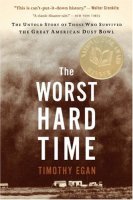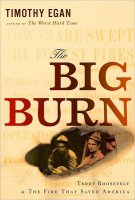

The Worst Hard Time by Timothy Egan (Houghon Mifflin, 2006)
The Big Burn: Teddy Roosevelt and the Fire that Saved America by Timothy Egan (Houghon Mifflin, 2009)
These two books were a gift from my brother and his family; my sister-in-law has an amazing nose for books. The first is about Dust Bowl times, and the second about the greatest single fire in recorded U. S. history.
In actuality, The Big Burn is more about the U. S. Forest Service, and Teddy Roosevelt's dream of setting aside large areas of wilderness to remain free from development. It didn't exactly work out that way, and the politics of that rocky and acrimonious battle are both enlightening and disgusting. The Worst Hard Time is equally educational.
Timothy Egan writes well, and has packed a great deal of both facts and emotion into these two, rivetting stories. My only complaint is that he lets too much of his own political views show through. All writers are biased, and that's okay, as long as they don't pretend not to be. It's the responsibility of the reader to take in information from multiple sources with competing biases in hopes of getting a glimpse of the truth. But in both books, it's hard not to see Egan's characters as ad hominem attacks on the viewpoints they represent. Somehow, the people he disagrees with are not just wrong, but are also fat, lazy, ignorant, greedy, and have disgusting habits. It's almost funny, but spoils the books a bit. It's as annoying when I agree with his position as when I don't.
Egan also has a tendency to conflate extraordinary hardship and that which was normal for the times and places he writes about. No doubt there were plenty of difficulties living in a sod house, for example, but Egan writes about them as a pampered, modern American would feel if suddenly plunked into that situation. As one of my friends has said, "I grew up in a very poor village, but we didn't know we were poor. It was normal life, and we were happy." Having just finished reading several novels by Miss Read (Dora Jessie Saint), in which the main character extols the virtues of her house's thatched roof, I couldn't help thinking that Timothy Egan would have missed all that, and concentrated on the dirt and the bugs, the mice and the birds' nests. What the Dust Bowl victims went through was horrific, and the damage to the land incalculable—but the failure to recognize the goodness of ordinary life, or of any good ground between greedily rich and grindingly poor, takes away from the story. Think of The Worst Hard Time as the anti-Little House on the Prairie.
That said, both books are still well worth reading for the gripping stories and the history lessons.
I believe PBS showed a Ken Burns documentary on the Dust Bowl that featured quite a few people interviewed in Egan's book. I only saw part of it, but probably worth seeking out to watch.
I have not yet read The Big Burn.
Thanks; it's on our Netflix list now. The Big Burn reminds me of my father's admonition, when I (as a know-it-all teenager) was looking down my nose at city life, especially New York City. (We Upstate New Yorkers felt about NYC the way we Floridians feel about Miami: interesting place, but more like a foreign country, and always voting contrary to the rest of the state.) That's when Dad would remind me that my beloved Adirondack Mountains would never have received their "Forever Wild" designation without the voters of New York City. Too many local people were more interested in the mountains as resources to exploit. Similarly, it apparently took a bunch of Yale-trained rich kids to make us realize that America's vast Western forests were treasures to be conserved for future generations.


